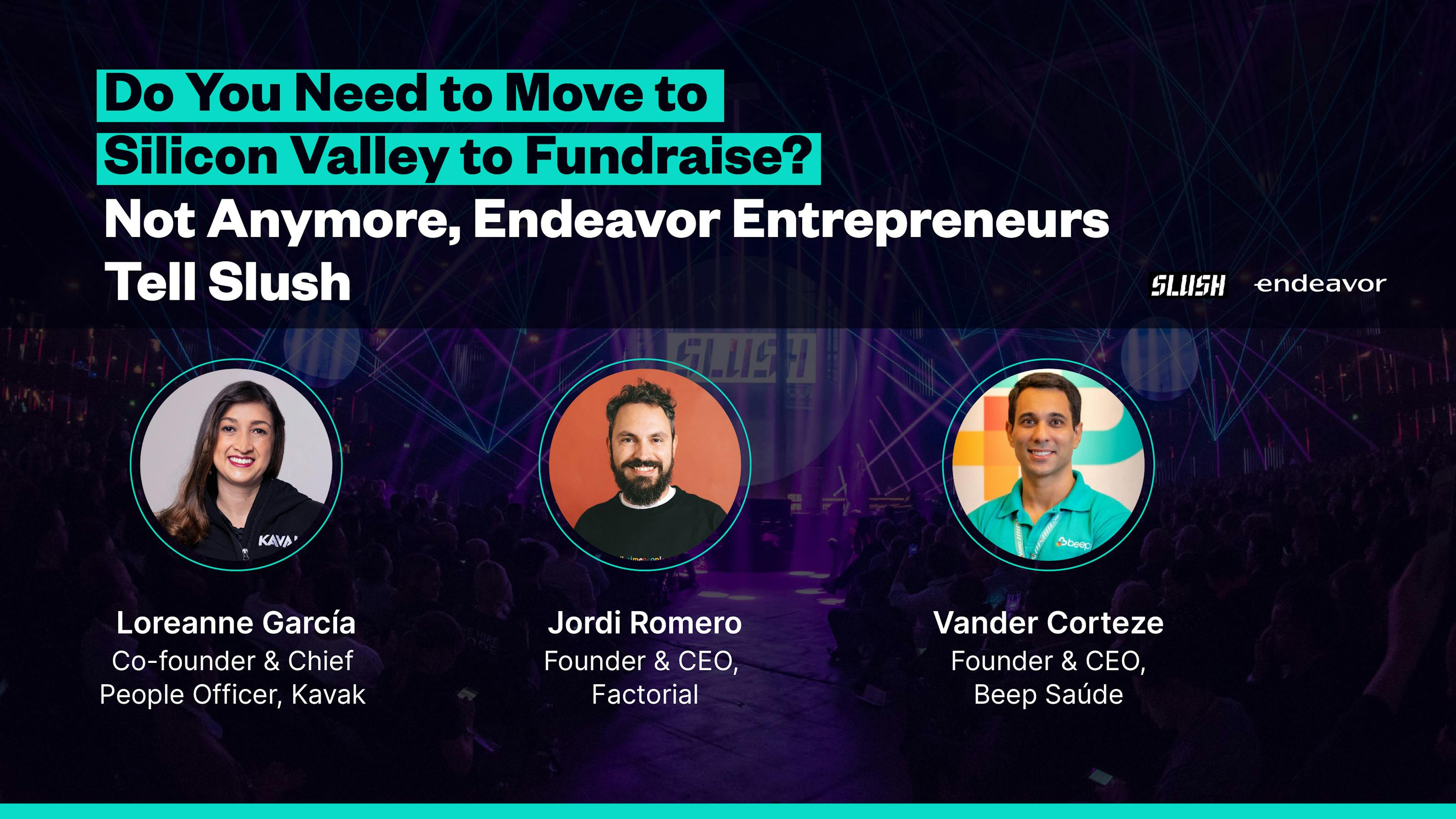Do You Need to Move to Silicon Valley to Fundraise? Not Anymore, Endeavor Entrepreneurs Tell Slush
By Endeavor Greece Dec 10, 2023
Endeavor has strategically prioritized extroversion and international visibility for our ecosystem's next growth phase, solidified through our role as Official Partners at Slush Summit 2023, Europe’s leading startup and technology conference. This collaboration serves as a key step in our commitment to fostering global connections and amplifying the presence of our ecosystem on the international stage. Our participation at Slush not only advanced our global engagement but also served as a platform to spotlight our entrepreneurs and influential network, positioning us as ambassadors connecting with individuals worldwide.
With these efforts in mind, we hosted a vibrant side event featuring unicorn founders Loreanne Garcia (Kavak), Vander Corteze (Beep Saude), and Jordi Romero (Factorial), who delved into the intriguing topic, "Where Do Unicorns Come From," inspired by Endeavor's latest research on billion-dollar companies worldwide. By shedding light on the real stories behind unicorn success and mapping diverse career pathways, we aimed to decode the fantasy surrounding these extraordinary ventures.

“I used to tell founders to move to Silicon Valley,” one unicorn founder said. Now it’s possible to raise millions over Zoom.
The mission of the entire Endeavor organization, including Endeavor Greece, is to boost the ability of high-impact entrepreneurs to scale their businesses and their impact in underserved markets. And one way we do that is by attracting and deploying capital to help their companies grow. How are we doing in this mission?
To answer this question we could look at statistics (Endevaor’s own in-house co-investment fund Catalyst has, for example, invested in 300+ companies across 37 markets to date). But you could also listen to the testimony of entrepreneurs themselves. Last week at Slush in Helsinki, Endeavor Greece brought together top Unicorn founders from the Endeavor Global Network to discuss the question of where, exactly, unicorns come from.
While the discussion yielded many fascinating insights, one message rang through loud and clear from the discussion: access to capital helps unicorns grow, and there is now far more capital flowing into underserved markets than there was even five or ten years ago (even despite the current chill in the funding landscape).

Founding a startup in 2010? Pack your bags.
Take the story of Jordi Romero, an Endeavor Entrepreneur and co-founder of Barcelona-based Factorial, for instance. At Slush, Romero explained how Factorial is actually his second startup. In 2010 Romero helped found collaboration platform Redbooth. Though the team was Spanish, they quickly decided to relocate the business to San Francisco.
“In my previous company, we tried to find investors in Barcelona. It was a SAAS business. And we started talking to local investors, Spanish investors, even European investors, and they all modeled our business after e-commerce or classified advertising or these other year 2000-type business models,” Romero recalled. “We were like, ‘No, this is a different business model. This is how you evaluate it. This is how you value it.’ It was a failure. We had to pack our bags and fly to San Francisco.”
Vander Corteze, MD, founder of Beep Saúde had a similar experience trying to find funding for his first business in Brazil. “My first company was founded in 2008. I don't know if a VC industry existed then. There probably one or two VCs,” he says of the investing landscape in his home country at the time.

Fast forward to 2023
While both these founders told the Slush audience that they had struggled to fundraise in their countries for their first businesses, the VC landscape is looking very different these days. When they founded Factorial in 2016, Romero and his co-founders felt much more optimistic about their chances of attracting investors without needing to relocate.
“We started with local angels, then European VCs. And then we were able to bring one of the top Silicon Valley investors to take some of their US dollars and convert them into euros and send them to Barcelona, which was surprising to us,” Romero reported. “Then we got global investors like Tiger Global, GIC out of Singapore, Atomico out of London, and all of these investors sent money to Barcelona.”
“It's been a huge change from 2010 to 2023,” he concluded. This shift has changed the advice he now gives to young founders. “I used to recommend to founders that you should go where the money is, at least for fundraising. Now you can even do this online. We raised the 66 million euro round with three days of Zoom calls. That was 2021. It's not so easy anymore. It takes a little bit more than a few Zoom calls, but you can still do it from a distant country.”
The shift in the fundraising landscape means founders in smaller markets can change their tactics and more easily put down roots in their home countries, multiplying their impact there. Thanks to the huge success of founders like Romero and Corteze — supported and boosted by organizations like Endeavor — investors are now much more willing to come to them.

